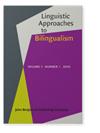Constraints on subject-verb agreement marking in Turkish-German bilingual speakers
IF 1.8
2区 文学
0 LANGUAGE & LINGUISTICS
引用次数: 2
Abstract
Turkish 3rd person plural subjects normally appear with verbs that are unmarked for number. Following earlier findings which indicate that Turkish heritage speakers (HS) accept overt plural marking more readily compared to monolingually raised Turkish speakers, the present study investigates to what extent bilingual speakers are sensitive to grammatical, surface-level and semantic constraints on Turkish plural agreement marking. A scalar acceptability judgement task was carried out with non-bilingual Turkish speakers residing in Turkey and Turkish-German bilinguals residing in Germany. Our experimental design involved manipulating both subject animacy and subject position. Participants’ judgement patterns confirmed Turkish speakers’ general preference for unmarked verb forms, which was modulated both by subject animacy and by subject position. Significant differences were observed between lower proficiency HS on the one hand, and monolinguals and advanced proficiency HS on the other, suggesting that the relatively subtle interplay between different types of constraint on number agreement marking is affected by heritage language conditions. We found no evidence for simplification or optionality reduction in the lower proficiency HS’ judgements, however. We innovate on previous research by using Gradient Symbolic Computation modelling to capture between-group differences in the relative weightings of the constraints under investigation.土耳其语-德语双语者主动一致标记的制约因素
土耳其语第三人称复数主语通常与没有数字标记的动词一起出现。早期的研究结果表明,与母语为土耳其语的人相比,母语为土耳其语的人更容易接受显性复数标记,本研究调查了双语者对土耳其文复数一致标记的语法、表面和语义约束的敏感程度。对居住在土耳其的非双语土耳其语使用者和居住在德国的土耳其语-德语双语者进行了标量可接受性判断任务。我们的实验设计包括操纵主体的动物性和主体的位置。参与者的判断模式证实了讲土耳其语的人对无标记动词形式的普遍偏好,这种偏好受到主语动物性和主语位置的调节。低水平HS与单语和高级水平HS之间存在显著差异,这表明不同类型的数字一致性标记约束之间相对微妙的相互作用受到传统语言条件的影响。然而,我们没有发现证据表明HS的低水平判断存在简化或选择性降低的情况。我们在之前的研究基础上进行了创新,使用梯度符号计算模型来捕捉所调查约束的相对权重的组间差异。
本文章由计算机程序翻译,如有差异,请以英文原文为准。
求助全文
约1分钟内获得全文
求助全文
来源期刊

Linguistic Approaches To Bilingualism
Social Sciences-Linguistics and Language
CiteScore
3.20
自引率
9.10%
发文量
24
期刊介绍:
LAB provides an outlet for cutting-edge, contemporary studies on bilingualism. LAB assumes a broad definition of bilingualism, including: adult L2 acquisition, simultaneous child bilingualism, child L2 acquisition, adult heritage speaker competence, L1 attrition in L2/Ln environments, and adult L3/Ln acquisition. LAB solicits high quality articles of original research assuming any cognitive science approach to understanding the mental representation of bilingual language competence and performance, including cognitive linguistics, emergentism/connectionism, generative theories, psycholinguistic and processing accounts, and covering typical and atypical populations.
 求助内容:
求助内容: 应助结果提醒方式:
应助结果提醒方式:


